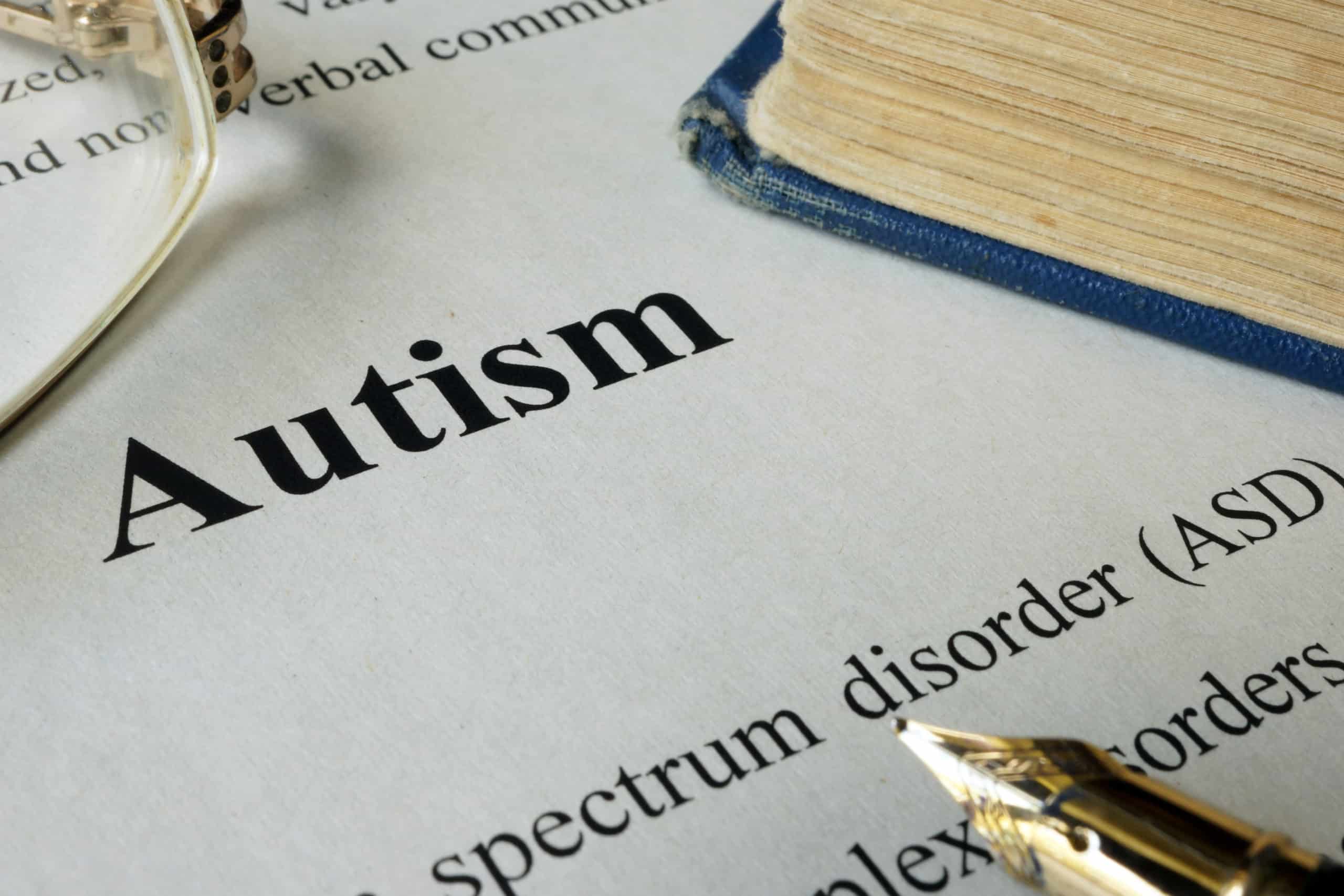The mean age of autism diagnosis in the US and UK is 4 to 5, though later diagnoses do occur (Zwiagenbaum et al., 2019). Age at diagnosis depends upon variables such as symptom severity, socioeconomic status, and initial parental concerns or misidentification of symptoms as behavioral issues (Fountain et al., 2011; Shattuck et al., 2009). Typically individuals with more severe symptom challenges receive an autism diagnosis early in life compared to those with subtle symptomatic differences (Zwiagenbaum et al., 2019; Edelson et al., 2020). Those diagnosed later in life are thought to have less severe symptoms and a higher likelihood of reaching self-sufficiency and functionality (Jones et al., 2014). However, this successful adaptation to symptoms often masks an autism diagnosis and leaves many of these individuals to experience autism-related health issues without understanding the root cause (Griffith et al., 2012).

Autism was first recognized in the Diagnostic and Statistical Manual for Mental Disorders in 1980 and until recently was understood only as a pediatric condition (Verhoeff, 2013); this left potentially significant numbers of teenagers and adults (now adults and seniors) under- or misdiagnosed for decades. As our understanding of autism and its prevalence has evolved, mid-to-late life diagnosis has become a more important topic in autism research (Au-Yeng et al., 2018). Presently, reliable assessments and diagnostic measures specific to older age groups have yet to be developed and widely accepted (Wingham et al., 2019). Edelson et al. (2020) presuppose that the current lack of a diagnosis may be due to insufficient healthcare training surrounding the medical and social/emotional needs and the communication, sensory and behavioral challenges faced by adults on the spectrum. They call for a greater focus on validated diagnostic assessments for adults and seniors with autism in order to provide sufficient medical and social support for these individuals.
Autism Symptoms in Adults
“Classic” symptoms of autism in children are not always present in adults on the spectrum, especially in those underdiagnosed as children (Lewis, 2018). Adults on the spectrum commonly exhibit symptoms related to social and communication difficulties, repetitive behaviors, sensory processing difficulties, and issues with executive function and theory of mind. Short descriptions and lists of common symptoms in adults are listed below (Autism Speaks, 2015; Lewis, 2018).
Social Symptoms
Social difficulties include issues with communication and understanding, which sometimes makes the ordinary exchange process of social conversation difficult. It is often difficult for adults with autism to see things from another point of view and interpret nonverbal communications such as eye-rolling, shoulder shrugging, or other facial expressions.
Examples include:
- May be prone to unintentional social blunders, misspeaking;
- Somewhat flat affect, or unique nonverbal emotional display;
- Experiences challenges maintaining conversations and staying on topic – responding with long monologues or extremely short answers;
- Language for social interaction is occasionally stilted;
- Difficulty articulating personal thoughts;
- Intense memory of details – such as facts or names;
- Needs support to understand figurative language – may be more comfortable taking things literally.
Repetitive Behaviors
Repetitive behaviors include restricted schedules and activities, strict layouts and consistency of surrounding environments, and intense interests or obsessions. Often repetitive behaviors are responses to overstimulation and signs of sensory processing issues.
Examples include:
- Self-stimulatory behavior like hand rubbing on thigh/finger rubbing in pockets or foot-tapping;
- Preference for sameness and routine – may experience stress or outbursts when these are interrupted;
- Dressing in comfortable clothes that may contradict social expectations;
- Susceptible to distraction by sounds or visual effects.
Executive Function
Executive function refers to abilities and skills related to planning, organizing, attention maintenance, and self-regulation. Adults on the spectrum may experience challenges with complex planning and thinking, making it difficult to see “big-picture” ideas into which their intense subjects of focus fit.
Examples include:
- Needs support to set long-term goals and schedules;
- May be unintentionally late or forget appointments;
- Experiences challenges understanding broad theories while mastering minute details;
- Needs encouragement and support to understand other people’s expectations and perspectives.
Is it Autism?
These symptoms do not categorically evidence an autism diagnosis. However, it is essential to note that autism is frequently accompanied by at least one co-occurring condition such as ADHD, anxiety, depression, gastrointestinal and immune function disorders, or epilepsy. If you have/currently suffer from a combination of these conditions (diagnosed or not), discussing the possibility of autism screening and diagnosis with your practitioner could supply answers and understanding to some health issues.
There is, to date, no laboratory test for autism. Autism screenings include questionnaires and observations to assess which symptoms are present and their severity. After an initial assessment, your clinician will likely refer you to a specialist team for proper autism screening and diagnosis.
Not all adults who identify with autism symptoms seek out a clinical diagnosis. That remains a personal choice, and there are benefits to both decisions. However, consulting with your general practitioner can help you better understand and manage autism symptoms even without a clinical diagnosis.
Post Diagnosis
Many autism services and programs are only available to those with a clinical diagnosis. After receiving an autism diagnosis, you can collaborate with your doctor to identify treatments and services specific to your needs. Getting involved in your communities can help you better understand autism and provide access to support through local groups and services designed specifically for individuals with your strengths and talents.
Our adult webinar page is a useful source of evidence-based information and resources for adults diagnosed with autism.
Study finds that employees with autism are less likely to exhibit “bystander” effect
Employees with autism spectrum disorders (ASD) may contribute to businesses in a unique way because they are less likely than neurotypical individuals to exhibit the “bystander” effect, according to a new
Prevalence of autism in adults increasing rapidly in the U.S.
The prevalence of autism spectrum disorders (ASD) among adults in the United States is rising rapidly, according to a new study. Eric Rubenstein and colleagues analyzed a random sample
Autistic adults show enhanced generosity toward strangers
Adults with autism spectrum disorders (ASD) tend to be more generous to strangers than their neurotypical peers are, according to new research. In the study, Paul Forbes and colleagues explored differences
From Special to H.A.P.P.Y.
Peter Vermeulen, Ph.D., considers a positive approach to psychoeducation for autistic individuals. He draws on over 25 years of experience to illustrate contemporary changes in autism intervention focus and discourse. The speaker
Older adults with ASD at higher risk for many health issues
A large-scale study from researchers in Sweden and Poland indicates that older adults with autism spectrum disorders (ASD) are at significantly higher risk than their non-autistic peers for a range of
LGBTQIA+ and Autism
Contemporary research on the intersection of autism, sexuality, and gender identity asserts that autistic individuals are more likely to identify as LGBTQIA+ than the neurotypical population. Similarly, the prevalence of autism is






